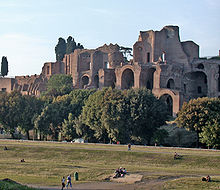palace
English
[edit]
Etymology
[edit]From Middle English paleys, from Old French palais, which comes from Latin palātium, from Palātium, in reference to the Palatine (Palatine Hill), one of the seven hills of Rome, where the aristocracy of the Roman Republic—and later, Roman emperors—built large, splendid residences.[1][2] The name is ultimately either from Etruscan, the same source as Pales (“Pales, the Italic goddess of shepherds, flocks and livestock”), or Latin palus (“stake; enclosure”). Doublet of palazzo and Pfalz.
Pronunciation
[edit]- IPA(key): /ˈpælɪs/
- (General Australian or weak vowel merger) IPA(key): /ˈpæləs/
Audio (US): (file) - Hyphenation: pal‧ace
- Rhymes: -ælɪs
Noun
[edit]palace (plural palaces)
- Official residence of a head of state or other dignitary, especially in a monarchical or imperial governmental system.
- A large and lavishly ornate residence.
- 1834, L[etitia] E[lizabeth] L[andon], chapter XXV, in Francesca Carrara. […], volume I, London: Richard Bentley, […], (successor to Henry Colburn), →OCLC, page 293:
- On Madame de Mercœur's arrival at the palace she found the carriage and guards in waiting, the Queen having decided that she would do her niece the honour of going to meet her.
- 1963, Margery Allingham, chapter 1, in The China Governess: A Mystery, London: Chatto & Windus, →OCLC:
- The original family who had begun to build a palace to rival Nonesuch had died out before they had put up little more than the gateway, […].
- A large, ornate public building used for entertainment or exhibitions.
Derived terms
[edit]- coffee palace
- Crystal Palace
- gin palace
- golden palace monkey
- ice palace
- Lambeth Palace
- lobster palace
- mayor of the palace
- memory palace
- mind palace
- movie palace
- palace car
- palace coup
- palace intrigue
- palace of culture
- palace politics
- palace-politics
- palace revolution
- palatial
- people's palace
- picture palace
- presidential palace
- puck palace
- Puzzle Palace
Translations
[edit]
| ||||||
Verb
[edit]palace (third-person singular simple present palaces, present participle palacing, simple past and past participle palaced)
- (archaic) To decorate or ornate.
- 1921, Kenneth Morris, The Crest-Wave of Evolution[1]:
- And this Great King was a far-way, tremendous, golden figure, moving in a splendor as of fairy tales; palaced marvelously, so travelers told, in cities compared with which even Athens seemed mean.
- 1874, Benj. N. Martin, Choice Specimens of American Literature, And Literary Reader[2]:
- May, with her green lap full of sprouting leaves and bright blossoms, her song-birds making the orchards and meadows vocal, and rippling streams and cultivated gardens; June, with full-blown roses and humming-bees, plenteous meadows and wide cornfields, with embattled lines rising thick and green; August, with reddened orchards and heavy-headed harvests of grain, October, with yellow leaves and swart shadows; December, palaced in snow, and idly whistling through his numb fingers;-all have their various charm; and in the rose-bowers of summer, and as we spread our hands before the torches of winter, we say joyfully, "Thou hast made all things beautiful in their time."
References
[edit]French
[edit]Etymology
[edit]Borrowed from English palace, itself from Old French palais. Doublet of palais.
Pronunciation
[edit]Noun
[edit]palace m (plural palaces)
Descendants
[edit]- → Turkish: palas
Further reading
[edit]- “palace”, in Trésor de la langue française informatisé [Digitized Treasury of the French Language], 2012.
Middle English
[edit]Noun
[edit]palace
- Alternative form of paleys
- English terms inherited from Middle English
- English terms derived from Middle English
- English terms derived from Old French
- English terms derived from Latin
- English terms derived from Etruscan
- English doublets
- English 2-syllable words
- English terms with IPA pronunciation
- English terms with audio pronunciation
- Rhymes:English/ælɪs
- Rhymes:English/ælɪs/2 syllables
- English lemmas
- English nouns
- English countable nouns
- English terms with quotations
- English verbs
- English terms with archaic senses
- English terms derived from toponyms
- en:Buildings
- en:Royal residences
- French terms borrowed from English
- French terms derived from English
- French terms derived from Old French
- French doublets
- French 2-syllable words
- French terms with IPA pronunciation
- French lemmas
- French nouns
- French countable nouns
- French masculine nouns
- Middle English lemmas
- Middle English nouns
